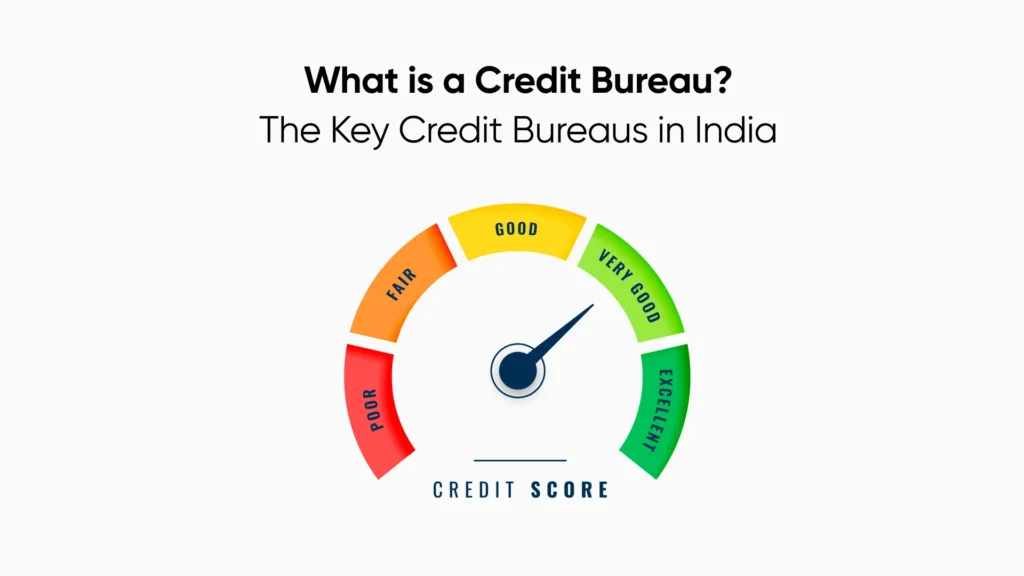What Is A Credit Bureau? The Key Credit Bureaus in India

One of the important aspects of your personal finance journey is understanding credit scores and how they are calculated. Credit bureaus collect, maintain and determine the credit score of an individual based on their credit history and credit behaviour. It is thus imperative to understand credit bureaus and their impact on your finances.
This blog explores the four main credit bureaus in India and the significance of each bureau.
Table of Contents
ToggleWhat are the Credit Bureaus in India?
A credit bureau in India is a licensed organization that collects and maintains individuals’ and businesses’ credit information. They track the credit history of borrowers, including loans, credit card usage, repayments, and defaults. The information collected is used to generate credit reports and scores, which help lenders assess a borrower’s creditworthiness before approving loans or credit facilities. These bureaus play a vital role in the financial ecosystem, offering transparency and reducing risks for lenders while providing individuals with a chance to showcase their financial responsibility. Major credit bureaus in India include CIBIL, Equifax, Experian, and CRIF High Mark.
How Does the Credit Bureau Work?
Credit bureaus collect and maintain financial information regarding an individual’s previous and current loans, credit cards and other credit information. Lending institutions provide this information to the credit bureaus every month. This information is used to determine the credit score of individuals
- Data Collection: Credit bureaus gather your credit information from various financial institutions like lending platforms, banks, collection agencies, public records, etc. They include information about your credit accounts, repayment history, outstanding debt, etc.
- Making Credit Reports: Based on this credit information, it generates a credit report. This report covers credit history, repayment history, credit utilization, credit enquiries, credit mix, and other information.
- Prepares Credit Scores: Credit bureau report gives your three-digit credit score. This credit score is used by potential lenders to evaluate your creditworthiness.
- Dispute Resolution: If there are any errors or discrepancies in the credit bureau credit report, consumers can directly report the error to the credit bureaus. The credit bureaus check the information and make corrections to the report.
- Maintenance: The collected data is securely stored in the credit bureau’s database, where it is consistently updated to reflect any changes in your credit activity. This ensures that the credit report remains accurate and up-to-date. Regular maintenance of this data is crucial to maintaining the integrity and reliability of the credit report, ensuring lenders always have access to the most current financial information when evaluating a borrower’s creditworthiness.
Importance of Credit Bureaus
Credit bureaus maintain credit reports and help lenders assess the creditworthiness of borrowers. The importance of credit bureaus is highlighted below:
- Risk assessment: Credit bureaus help financial institutions and banks evaluate the risk factors of an individual or a business. A high credit score indicates the borrower is a low-risk individual while a low credit score may be due to debts & financial instability.
- Determining credit score: A credit score is a quick way for a lender to assess creditworthiness. This score helps lenders determine loan approval and interest rates.
- Encourages financial discipline: Since credit records are tracked and maintained by the credit bureau, it encourages individuals to be financially disciplined and make timely credit payments.
- Fraud prevention: Credit bureaus help in detecting fraudulent activities. They provide alerts about suspicious activity or any discrepancies in a credit report. This helps consumers take action quickly against cases of identity theft and other forms of fraud.
Also Read: Credit Score vs CIBIL Score: What is the Difference?
List of Credit Bureaus in India
Credit bureaus in India help lenders track and assess the creditworthiness of individuals and businesses. Regulated by the Reserve Bank of India (RBI), these bureaus ensure fair and accurate credit assessments.
Let’s take a look at the main credit bureaus in India and what they do.
TransUnion CIBIL
- The Credit Information Bureau (India) Limited (CIBIL) is one of the oldest and most popular credit information companies licensed by the Reserve Bank of India.
- The CIBIL score ranges from 300 to 900. It is a part of the American multinational group TransUnion and is widely used in India. This score represents the credit history of the individual. Lenders and financial institutions use this to determine the creditworthiness of a borrower during loan application.
- A good score is typically 700 or above. Having a high credit score improves the chances of loan approval.
- If you want to build a good credit score, it takes 18 to 36 months of consistent and responsible credit usage to build a satisfactory CIBIL score.
- Lenders also consider credit reports and other details when assessing an applicant’s creditworthiness. Factors like timely bill payments and responsible credit use also add to improving one’s CIBIL score.
Experian
- Experian is a globally recognized consumer credit reporting company that operates in 37 countries, including India.
- In India, it was established in 2010. It collects credit information on individuals and companies, providing credit scores and detailed Credit Information Reports (CIR).
- It has a license to operate by the Reserve Bank of India as an independent entity and serves member institutions like banks and NBFCs to make informed lending decisions.
- It is important to check your Experian credit score before you apply for a loan. Several factors like timely payments, length of credit history, inquiries, and other such things can impact the credit score.
- A good Experian score is typically above 750. A low score may lead to challenging loan approvals with strict terms.
Equifax
- Equifax is an American-origin credit information company that operates globally in 15 countries. It has been active in India since 2010 under the Credit Information Companies (Regulation) Act.
- In India, it operates as Equifax Credit Information Services Private Limited (ECIS) via a joint venture with 7 major Indian financial institutions.
- Equifax collects credit-related data from lending institutions as per RBI mandates and generates a three-digit credit score for individuals. This credit score ranges from 300 to 900.
- The Equifax Consumer Credit Database has a wide reach and is constantly updated with accurate data.
- The credit information of consumers is presented in the form of Credit Information Reports (CIRs) and Credit Scores that are calculated and generated using a specific algorithm and maintain global standards.
- Global standards benefit both lenders and borrowers by improving loan approval processes, and efficiency, and enhancing transparency.
- Equifax’s database also supports several value-added products, like credit risk management, fraud detection, and marketing tools.
CRIF High Mark
- CRIF High Mark is headquartered in Mumbai, India and is the first full-service credit bureau that offers comprehensive credit information for all borrower segments across India, including retail consumers, MSME (Micro Small, and Medium Enterprises), as well as commercial and microfinance borrowers.
- Along with providing credit reports and credit scores, CRIF High Mark also offers analytics, insights, data management, and related software solutions to banks, MFIs, NBFCs, Housing Finance Companies (HFCs), insurance companies, telecom service providers, etc.
- It caters to diverse borrowing segments such as retail, microfinance, MSMEs, and commercial borrowers.
- The CRIF Credit Score, is a three-digit number ranging from 300 to 900 that evaluates an individual’s creditworthiness. A score above 700 is considered good, indicating responsible credit behaviour and improving chances of loan approval.
- CRIF credit information report (CIR) is a comprehensive credit profile that includes personal information with a credit summary.
- If you want to get a credit report from CRIF, you need to select the report type (free, paid subscription, or paid without a score). The credit report is delivered to you via email.
Also Read: Experian Vs CIBIL : Definition, Meaning & Differences
What are the Credit Rating Agencies?
Credit rating agencies (CRAs) are organizations that assess the creditworthiness of individuals, companies, or governments by analyzing their financial history and ability to repay debts. They assign a credit rating, which helps lenders and investors determine the level of risk associated with lending money or investing. In India, the major credit rating agencies include CRISIL, ICRA, CARE Ratings, and India Ratings. These agencies play a vital role in the financial ecosystem by providing transparency and enabling more informed lending and investment decisions. A higher credit rating typically results in better loan terms and lower interest rates.
How Credit Bureaus Impact Your Credit Score
Credit score is calculated based on data of an individual or a business that includes their payment history, credit utilization, length of credit history and any new credit enquiries.
Based on the data taken from lenders, credit bureaus calculate this score, which is represented by a 3-digit number. Thus, the credit bureaus impact your credit score due to the following factors:
- Data Collection: They gather information from banks, lenders, and credit card companies about your borrowing history and repayment behaviour.
- Credit History: They track and maintain your payment history, loan amounts, credit utilization, and any defaults.
- Score Calculation: Using this data, they calculate your credit score. This score helps lenders determine your creditworthiness during loan approval.
- Impact on Loans: Lenders use credit scores to determine loan approval and decide on the interest rates, loan tenure and credit limits.
Why Different Credit Bureaus Show Different Scores
One may assume that the credit score is the same everywhere. However, this is not the case.
- Different Algorithm: Each credit bureau has a separate algorithm and scoring model to calculate the credit score. Thus, it is quite common to get a different credit score from each different credit bureau.
- Different Update Timings: Credit bureaus get credit data from lenders and financial institutions at different times, leading to different credit scores.
- Inconsistent Information: Another reason for different credit scores is loan applications with a co-applicant or inconsistency in providing information about them.
Conclusion
Knowing about the 4 major credit bureaus – TransUnion CIBIL, Experian, Equifax, and CRIF High Mark, will help you understand credit scores and how to maintain a good credit score. It helps lenders determine the creditworthiness of a borrower during the loan approval process and offer interest rates based on that data.
Once you are aware of what factors affect your credit score, you are better equipped to improve your credit score or maintain a high credit score. This makes it easier for you to get loan approval faster when applying for any type of loan.
Frequently Asked Questions
What Are The Credit Bureaus In India?
Credit bureaus in India, such as CIBIL, Equifax, Experian, and CRIF High Mark, collect and maintain credit-related information of individuals and businesses. They generate credit reports and scores that lenders use to assess creditworthiness.
What Are The 3 Major Types Of Credit Bureaus?
The three major credit bureaus in India are CIBIL, Experian, and Equifax. They are responsible for collecting and maintaining credit information.
Are CRIF and CIBIL The Same?
No, CRIF and CIBIL are different entities. CIBIL (Credit Information Bureau India Limited) is the most well-known credit bureau in India, while CRIF High Mark is another credit information company that operates in the country.
What Is The Purpose Of A Credit Bureau?
The main purpose of a credit bureau is to collect, maintain, and provide credit information that helps lenders make informed decisions about lending to individuals or businesses.
Which Credit Bureau Is Approved By The RBI?
The Reserve Bank of India (RBI) recognizes several credit bureaus, including CIBIL, Equifax, Experian, and CRIF High Mark.
Which Credit Bureau Is Most Accurate In India?
Accuracy depends on data sources and reporting. CIBIL is the most commonly used credit bureau in India, and it is widely regarded for providing reliable data. However, each bureau has slightly different data sets, so checking reports from all major bureaus is ideal.
Which Credit Bureau Is Mostly Used?
CIBIL is the most commonly used credit bureau in India, and it is frequently consulted by lenders to check credit scores and reports.
Who Regulates Credit Bureaus In India?
Credit bureaus in India are regulated by the Reserve Bank of India (RBI). The RBI sets guidelines and regulations for their operations to ensure transparency and fairness in credit reporting.
How Is A Credit Rating Denoted?
A credit rating is typically denoted by a score or grade. In India, CIBIL scores, for example, range from 300 to 900, with higher scores indicating better creditworthiness.
What Is The Number Of Credit Rating Agencies In India?
There are several credit rating agencies in India. The major ones include CRISIL, ICRA, CARE Ratings, and India Ratings. These agencies provide ratings for individuals, companies, and governments.
YOU MAY ALSO LIKE



Search by posts
Categories
- Blog (6)
- Credit History (37)
- Credit Line (7)
- Festive (4)
- Finance (15)
- Mutual Fund (19)
- Personal Loan (299)
- Tax (8)
- Zype (4)











